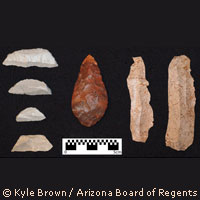Early modern humans use fire to make stronger, better tools
EU-funded researchers have shed new light on human behavioural evolution by investigating how early modern humans in southern Africa successfully used fire to improve the quality and efficiency of stone tools. The findings, published in the journal Science, show that humans probably started solving complex problems around the time when their modern genetic lineage materialised (200,000-150,000 years ago), contrary to initial reports that this ability developed later in time. The international research team discovered that early modern humans living in caves in Mossel Bay and Still Bay, South Africa some 70,000 years ago fired and flaked silcrete (very tough rock) in order to make stone tools. By heating the silcrete, these early humans changed the structure of the stone and transformed it into excellent raw material which they then used to produce more sophisticated tools. 'The controlled use of fire was a breakthrough invention that allowed cooking, the production of warmth and light, and protection from predators,' the research showed. 'Heat treatment and its requirements signal an important technological advance, in that fire was now being carefully manipulated as an engineering tool.' Lead author Kyle Brown, a doctoral candidate at the University of Cape Town, South Africa, and field and lab director in Mossel Bay for the Institute of Human Origins at Arizona State University (ASU) in the US, said: 'Our illumination of the heat treatment process shows that these early modern humans commanded fire in a nuanced and sophisticated manner. 'We show that early modern humans at 72,000 years ago, and perhaps as early as 164,000 years ago in coastal South Africa, were using carefully controlled hearths in a complex process to heat stone and change its properties - the process known as heat treatment,' he added. The ASU's Professor Curtis Marean, project director and co-author of the study, pointed out that someone discovered it was easier to flake stone when heat was applied to it. 'This knowledge is then passed on, and in a way unique to humans, the technology is slowly ratcheted up in complexity as the control of the heating process, cooling and flaking grows in sophistication,' he explained. This valuable technological process was created as complex cognition emerged in humans, and could have spread so successfully because at that point language had developed enough to be used as a teaching and learning tool. In an accompanying article, John Webb and Marian Domanski explained that the use of fire 'as an engineering tool is an early step in the evolution of means by which humans could control their environment'. They said heat treatment in Africa materialised around the same time as 'widespread evidence for symbolic behaviour, signalling the development of increasingly complex cognitive ability'. They added: 'By enabling the manufacture of more efficient tools, heat treatment may have played a key role in allowing early modern humans to spread rapidly from the relatively benign environments of southern African into the colder, more hostile environments of Europe.' European Neanderthals 'apparently lacked this technique, perhaps giving the early modern humans an evolutionary advantage as they moved into Eurasia', Drs Webb and Domanski speculate. EU support for the research came from a Marie Curie International Outgoing Fellowship awarded under the Seventh Framework Programme (FP7).
Countries
Australia, France, United Kingdom, United States



